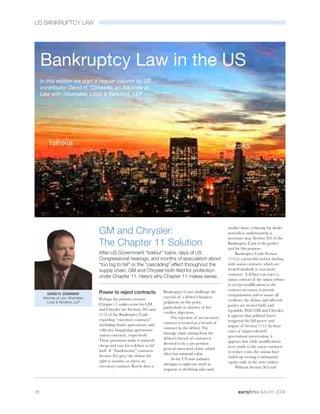
Bankruptcy Law in the US
- 1. US BANKRUPTCY LAW Power to reject contracts Perhaps the primary reasons Chapter 11 makes sense for GM and Chrysler are Sections 365 and 1113 of the Bankruptcy Code regarding “executory contracts” (including dealer agreements) and collective bargaining agreements (union contracts), respectively. These provisions make it relatively cheap and easy for a debtor to rid itself of “burdensome” contracts. Section 365 gives the debtor the right to assume, or reject, an executory contract. Rarely does a Bankruptcy Court challenge the exercise of a debtor’s business judgment on this point, particularly in absence of key creditor objections. The rejection of an executory contract is treated as a breach of contract by the debtor. The damage claim arising from the debtor’s breach of contract is deemed to be a pre-petition general unsecured claim, which often has minimal value. As the US auto industry attempts to right-size itself in response to declining sales and market share, reducing the dealer network is, unfortunately, a necessary step. Section 365 of the Bankruptcy Code is the perfect tool for this purpose. Bankruptcy Code Section 1113 is a powerful tool for dealing with union contracts, which are treated similarly to executory contracts. A debtor can reject a union contract if the union refuses to accept modifications to the contract necessary to permit reorganisation and to assure all creditors, the debtor and affected parties are treated fairly and equitably. With GM and Chrysler, it appears that political forces tempered the full power and impact of Section 1113. In these cases of unprecedented government intervention, it appears that while modifications were made to the union contracts to reduce costs, the unions have ended up owning a substantial equity stake in the new entities. Without Section 365 and DAVID H. CONAWAY Attorney at Law, Shumaker, Loop & Kendrick, LLP 36 Autumn 2009 GM and Chrysler: The Chapter 11 Solution After US Government “bailout” loans, days of US Congressional hearings, and months of speculation about “too big to fail” or the “cascading” effect throughout the supply chain, GM and Chrysler both filed for protection under Chapter 11. Here’s why Chapter 11 makes sense Bankruptcy Law in the US In this edition we start a regular column by US contributor David H. Conaway, an Attorney at Law with Shumaker, Loop & Kendrick, LLP
- 2. US BANKRUPTCY LAW 1113, debtors would be required to terminate contracts under various state and federal laws including labour laws, franchise laws, dealership laws and state contract law. This would be an overwhelming task as virtually every state’s laws would be involved and litigation would almost certainly be required. It could take years and incredible financial resources to terminate contracts without Section 365 of the Bankruptcy Code… neither cheap nor easy. Power to write down secured debt Another reason why Chapter 11 makes sense relates to the Bankruptcy Code’s treatment of secured debt. The recent headlines reported that GM and Chrysler’s major creditors took substantial “hair cuts” regarding the indebtedness owed to them. In particular, in Chrysler the secured lenders received only 29% of their claims. The reason why secured lenders can be compelled to accept less is Section 506(a) of the Bankruptcy Code, which provides that a creditor is secured only to the extent of the value of its collateral. In GM, the Bankruptcy Court found that even though the secured debt was approximately $50 billion, the liquidation value of the GM assets was between $6– $10 billion. Another motivation may have been the leverage of the US Treasury Department as many of the lenders were TARP (Troubled Asset Relief Program) participants. Interestingly, one non-TARP secured lender to Chrysler, the Indiana State Teachers Retirement Fund, objected to the Chrysler settlement. Other dynamics may impact the debtor’s use of Section 506(a) as a tool to write-down debt. For example, the debtor’s pre-petition lender is often the debtor’s Chapter 11 and exit lender. Thus, lenders may be able to “negotiate” the secured debt write-down. Power to sell assets free and clear of liens One more reason Chapter 11 is the best option for GM and Chrysler is Section 363 of the Bankruptcy Code, relating to sales of assets. In a non-bankruptcy setting, to sell assets, a debtor must comply with the laws of each jurisdiction where assets may be located. The respective rights of parties’ competing secured or lien interests must be resolved prior to sale, which will likely require litigation and very often results in a non-unified, piece-meal sale of assets. By the time the parties’ respective rights are adjudicated, the operating losses have likely eroded the asset values substantially. Section 363, by contrast, allows a debtor to sell assets, including substantially all of its assets, free and clear of liens, with the liens attaching to the proceeds of sale. This eliminates the need to adjudicate the rights of various parties in the assets prior to sale. Moreover, Section 363 allows for a quick sale of assets to avoid further operating losses and hopefully achieve maximum value for the assets. The Section 363 sale often culminates in an “auction” where the “best” bid is selected and approved by the Bankruptcy Court. In the case of GM and Chrysler, both “debtors” were able to obtain quick Bankruptcy Court approval of Section 363 sales. The tools of Chapter 11, specifically Sections 365 and 1113 (rejection of contracts), Section 506(a) (write-down of secured debt) and Section 363 (sale of assets) make Chapter 11 the ideal solution for GM and Chrysler. These tools have been and will continue to provide struggling businesses in all industries substantial incentive to choose Chapter 11 as a business strategy to restructure, reorganise, and to liquidate business operations and their assets. Autumn 2009 37 Section 363 allows a debtor to sell assets free and clear of liens ” “